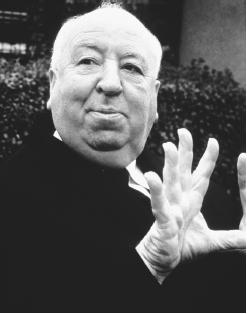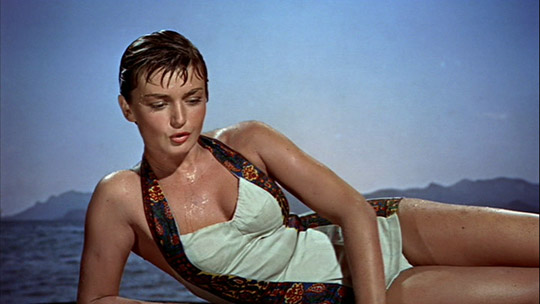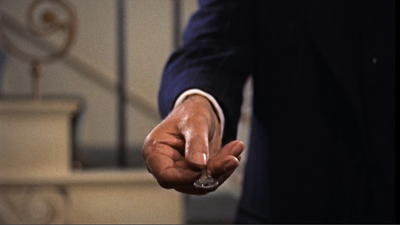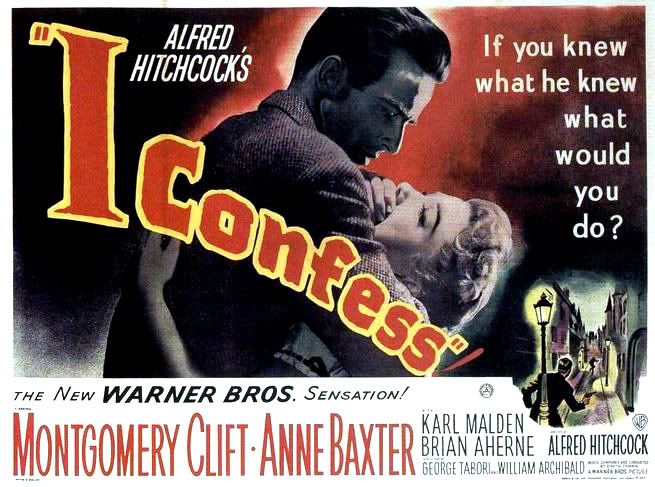
Sorry for the long wait! Below are the next four films of the Hitchcock Retrospective, putting the total of Hitchcock films seen up to 16! If this is the first entry you've seen, I've been working my way back through Hitchcock's films starting with his final film "Family Plot". You can find the previous three entries here:
Hitchcock Reverse Retrospective Part One - Family Plot, Frenzy, Topaz and Torn Curtain
Hitchcock Reverse Retrospective Part Two - Marnie, The Birds, Psycho and North By Northwest
Hitchcock Reverse Retrospective Part Three - Vertigo, The Wrong Man, The Man Who Knew Too Much and The Trouble with Harry
I was just double checking a actor's name from one of these four films when I realised that three of them had Grace Kelly as the lead. She possibly deserves a bit of credit for giving such varied performances that I couldn't tell that it was the same woman each time. She receives the opportunity to both play and to subvert the "hysterical blonde" character that Hitchcock seems to love to employ (often accompanied by a more character-filled brunette who is not the main love interest).

So, as in previous entries I've been watching through the films in reverse chronological order of release, but the four reviews below work in reverse order of preference. So the films were viewed in the following order: "To Catch A Thief" (1955), "Rear Window"(1954), "Dial M For Murder" (1954) and "I Confess" (1953).
To Catch a Thief (1955)

This is another Hitchcock film starring Cary Grant. The other of which being "North By Northwest", my favourite Hitchcock film so far. Now when I saw "North By Northwest" I must admit that two things somewhat puzzled me. First was why anyone would think that Cary Grant's character was some kind of spy and secondly why the woman on the train would want to throw herself at him. Now watching "To Catch a Thief" I wonder why I ever found either of those ideas so strange.
Cary Grant in this film is like the American equivalent of James Bond. When the police come by he neatly, casually and expertly eludes them and goes off to, once again - very casually, investigate what the police are after. After that, I've NO trouble understanding why women are throwing themselves at him and this time he has at least three. He apparently feels that Brigitte Auber is too young for him (though it's more that she's the daughter of an old associate), but that doesn't stop her from pursuing him anyway.

Grace Kelly's character wants to remain somewhat aloof, but clearly likes him a lot in spite of herself. Meanwhile even Jessie Royce Landis, who plays Grace Kelly's mother, seems to fancy Cary Grant (and, once again, in THIS film - not a surprise!)
Grace Kelly doesn't exactly do hysterical blonde here, but she also doesn't seem as interesting as the other two brunettes. (When I'm thinking that the male protagonist would be better off with your mother, you're probably doing something wrong.) Admittedly though, once the film gets going she grows as a character.

The premise is that Cary Grant is well-known as an old jewel thief. However, since working for the French resistance during the war he received a pardon at the end of the war for any and all robberies up to that point. He can therefore enjoy the spoils of his old criminal capers in relative good conscience (so long as his pardon continues to be honoured). However, when another thief uses his old modus operandi to conduct robberies, it looks to the police like he is back to his old tricks. Rather than turning himself in, Cary Grant decides to study this new thief's methods and catch him in the act. But then again, won't it make framing him for the robberies even easier if he is present at the crime scene?
It's a pretty exciting little plot with interesting characters, a good sense of fun and with Cary Grant just being generally brilliant. There's a whodunnit element which was more predictable than some, yet not SO predictable that I was annoyed when I guessed it before time.

With an exciting plot and an awesome leading man, this is one of Hitchcock's best. Love it!
A+
Rear Window (1954)

I was seriously worried when I put this into the machine. I'd only recently watched two Hitchcock films starring James Stewart which I felt were highly overrated. Not least "Vertigo", which was recently placed near the top of a pretentious "great movie ever" list for the publication "Sight and Sound" (with no films in its top ten released within the past 40 years). Now here was a film regularly touted as one of Hitchcock's best and there, once again, was James Stewart's name on the box.
Now don't get me wrong. I love "It's A Wonderful Life" as much as the next man. But that didn't stop me feeling nervous. Thankfully I found my mind being quickly put at rest when James Stewart didn't seem to be taking himself so seriously as in the other cases. As much as the character is depressed and brooding, he expresses this through extreme cynicism this time.

So yes, no drugging his wife before giving her devastating news or forcing a woman to wear the same clothes of his old dead lover. (And nothing like Sean Connery in "Marnie" either, so no blackmailing women into marriage.) Yes, he's still a little dismissive of women, but this time it feels like he's mainly dismissive of marriage as an institution. He's playing a photographer and prides himself on his spectacular photographs. Achieving one of these spectacular photographs (of a crashing racing car) landed him in a wheelchair and is severely limiting his movement, much as he worries that a marriage would.
Naturally there's never just one female protagonist. If one's a blonde there's generally at least one brunette as a counter-balance. In comes Thelma Ritter as a nurse who comes to check on the protagonist. There's some neat banter between her and Stewart and she plays the part wonderfully.

Later on we see Grace Kelly enter as the rich and efficient woman who wants to tie down James Stewart's protagonist. Far from being a hysterical blonde she manages to be highly sensible and proactive even while she puts far too much effort into pleasing the unappreciative male protagonist who clearly doesn't deserve her. As the film goes on and the plot thickens, we see her willing to go to great lengths and severely risk her safety. In this film Kelly's character works on her own initiative and doesn't feel like she's just going along with the male protagonist's whims.

Eventually James Stewart's protagonist, who is essentially sitting in his flat waiting impatiently for the time when he is able to not only get out of his flat but fly to exotic locations around the world taking incredible photos, finds something that fascinates him just outside his own window. Ethical issues are raised about snooping through people's windows (particularly with binoculars). Still, on the other hand there's the ethical consideration that, once you've seen something terrible while snooping, shouldn't you act on it?

Hitchcock gets to show off some wonderful filmmaking with his continuous and expertly choreographed shots of the series of flats with all the bustle of activity. It probably helps to make this film universally adored amongst typical filmgoers and hardened old-fashioned critics alike when it has the elements of clever filmmaking, an engaging plot and witty banter all working in tandem. (While "Vertigo" arguably had the first of those three and that's about it.)
While I wouldn't say Rear Window was the best Hitchcock film ever, it's a solid A.
A+
Dial M for Murder (1954)
This was the first of Grace Kelly's roles in a Hitchcock film and she is firmly lodged into the hysterical blonde role. Well, I say hysterical. It's a more low-key hysterical blonde performance. She's a traumatised woman who always does precisely what her husband tells her to do, no matter how stupid.
"Don't call the police, darling." "Oh of course, my oh-so-sensible husband." Oh ffs! Protest! Tell him you MUST phone the police! Put up a bit of an argument and don't be so wet! Gah!

Meanwhile the husband, played by Ray Milland, is wonderfully fiendish, cold and calculating. I absolutely loved every minute he was on screen. I actually saw this film before "The Man With The X Ray Eyes" (where he also starred) and found myself wishing for his scientist character in that film to be more villainous and dastardly like he is in this Hitchcock classic.

The plot wraps up perhaps a little too neatly and, like I said before, relies perhaps a little too much on the wife being a wet blanket (even after proving unexpectedly physically formidable - though I'm risking spoilers just saying THAT much). Still, it's a cool little murder mystery and enjoyed it very much. Ray Milland's performance alone makes this an absolute must-see.

Interestingly this was apparently a 3D film originally. There's only one scene which gave this away to me. At one point a particular an item is held right up to the screen for the audience to see. It seems pretty clear that this is supposed to be held right out of the screen and in the audience's face. (Since apparently the 3D back then caused even worse headaches than it does now, with the 3D in Friday the 13th: Part 3 apparently causing a searing headache which continues for around four hours after the film is over, I feel that I'm happy to have seen this without that additional effect.)

A highly effective murder mystery with a cool central performance from Ray Milland. While rightly not put up there with Hitchcock's very best, it's hard not to squee over it.
A-
I Confess (1953)

This was a pretty cool premise. A priest hears a confession of murder and is then bound to honour the sacrament of the confessional when the police ask questions. Things become further complicated when the priest himself becomes a suspect.

Unfortunately quite a major part of the plot is a "scandal" which actually isn't that scandalous. There's some kind of relationship between the priest and a married lady, but any potential scandal turns out to be pretty minor. They had a relationship before she was married and before the priest entered the priesthood. They have since got back in touch but there's been no sex, no kissing, nothing that would impune their honour. Yet for absolutely no reason, they decide that it is scandalous to mention that they were even in each other's presence.
This "scandal" was quite ludicrous and what's more the whole thing is told by Anne Baxter in full "hysterical blonde" mode. There's a whole "woe is me" element to the whole story and the character is defined by her relationship with the men around her. It's nothing against the actress of course. This is how Hitchcock has asked her to play the part. How he often likes to have his blonde actresses play their parts. It's just that it's kind of irritating for a modern audience to have women portrayed in this way.

So who's the corresponding brunette? Well, it could be the murderer's wife who, while mostly in the background, proves to have rather more to her by the end. Still this is more like the female baddie who's a slave to her conscience (as in "The Man Who Knew Too Much", though at least this time she's not part of a whole criminal organisation) rather than the preferable snappy brunette character with a bit more personality to her (like the brunette artist friend in "Vertigo").
The final scenes inject some well-needed excitement into this rather plodding script. But it's all too little too late. The beginning of this film is fine, the ending is pretty good, but the middle is dull as ditchwater. What's more, surely if a person keeps on referring to his confession OUTSIDE of the confessional box, that is not owed the same secrecy? The murderer keeps on taunting the priest, seemingly forgetting that he is no longer in the confessional booth where his words must not be passed on. What's more the priest seems to be expected not to mention that the murderer was even in the Church that night. Perhaps we needed an "as-you-know-Joe" bit of dialogue to explain how this confessional stuff really works, because I can't help but feel that the rules are being beefed up to make for a more compelling mystery (and if so, why is the film so slow paced)?
D-
Rankings of all Hitchcock's movies reviewed so far:
1. North By Northwest (1959) A+
2. Psycho (1960) A+
3. The Birds (1963) A+
4. To Catch a Thief (1955) A+
5. Rear Window (1954) A+
6. The Trouble with Harry (1955) A-
7. Dial M for Murder (1954) A-
8. Topaz (1969) B+
9. The Wrong Man (1956) C+
10. Family Plot (1976) C+
11. Frenzy (1972) D+
12. The Man Who Knew Too Much (1956) D-
13. I Confess (1953) D-
14. Torn Curtain (1966) D-
15. Marnie (1964) E-
16. Vertigo (1958) E-